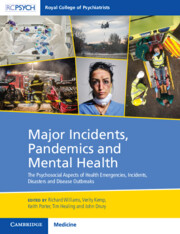 Major Incidents, Pandemics and Mental Health
Major Incidents, Pandemics and Mental Health from Section 1 - The Nature and Impacts of Twenty-First-Century Healthcare Emergencies
Published online by Cambridge University Press: 11 January 2024
Disasters are much misunderstood events, with misassumptions being common currency in popular culture, mass media, and even professional walks of life. We term these the myths of disasters for convenience. Rather than absolute errors of perception, they represent statistical generalisations about what is unlikely to happen in calamity. That people panic is perhaps the most common and enduring myth of all. Panic is a transient phenomenon that occurs only in specific circumstances. Looting, a measure of the breakdown of social order, is also uncommon, although it may occur where preconditions for it exist. Like other misconceptions, these myths fit easily into the ‘Hollywood model’ derived from highly stylised disaster movies. This model is countered by the therapeutic community that sociologists have found in post-disaster settings. Better education and more responsible reporting could do much to reduce beliefs in inaccurate portrayals of the phenomenon.
To save this book to your Kindle, first ensure no-reply@cambridge.org is added to your Approved Personal Document E-mail List under your Personal Document Settings on the Manage Your Content and Devices page of your Amazon account. Then enter the ‘name’ part of your Kindle email address below. Find out more about saving to your Kindle.
Note you can select to save to either the @free.kindle.com or @kindle.com variations. ‘@free.kindle.com’ emails are free but can only be saved to your device when it is connected to wi-fi. ‘@kindle.com’ emails can be delivered even when you are not connected to wi-fi, but note that service fees apply.
Find out more about the Kindle Personal Document Service.
To save content items to your account, please confirm that you agree to abide by our usage policies. If this is the first time you use this feature, you will be asked to authorise Cambridge Core to connect with your account. Find out more about saving content to Dropbox.
To save content items to your account, please confirm that you agree to abide by our usage policies. If this is the first time you use this feature, you will be asked to authorise Cambridge Core to connect with your account. Find out more about saving content to Google Drive.